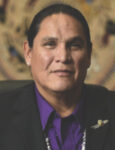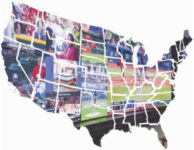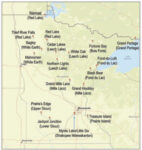
One of the things I always admired about tribal government gaming is how it has changed the lives of thousands of people. From a time when many Native Americans were consigned to lives of poverty and deprivation to the endless possibilities today, tribal gaming has been an opportunity for tribal members and non-native people from the surrounding communities.
When we decided to find some of the people whose lives were altered inexorably by tribal gaming, we went into it with no preconceived notions about who we should recognize. We consulted our advisory board and other members of the tribal gaming community for suggestions, and we were inundated.
As if to confirm my statement above, there clearly are thousands (maybe hundreds of thousands) of people who can credit tribal gaming for not only a career, but such a dynamic change in their family circumstances that now their sons, daughters, brothers, sisters, aunts and uncles have all benefited.
Whether that is because of per-capita payments, improved tribal services via gaming revenue, or opportunities for educational experiences previously beyond their reach, I believe that the realization there is more out there than a just struggle to survive was crucial to the success of Indian gaming.
What we didn’t predict, however, is how many of the nominees would be women. We should have realized that would happen, given the vast number of women who have played crucial roles in the development of tribal government and tribal gaming.
In this issue of Tribal Government Gaming, we have a shining example in Brenda Soulliere, who helped to lead the Cabazon tribe when its bingo halls were shut down by county authorities, and then to develop the casinos that have become the tribal economic lifeblood.
And you could go all the way back to the mid-1950s, when five women were elected to the tribal council for the Agua Caliente tribe and the role they played in the development of the Spa Hotel, later a tribal casino. The same could be said about Marge Anderson, who served 13 years as head of the Mille Lacs Tribe of Ojibwe, and developed some of the quality tribal casinos in Minnesota. And not to mention Sandra (Ninham) Brehmer and Alma Webster, the “mothers” of Oneida bingo in Wisconsin, the precursor of the casino empire the tribe has in place today. Former Nottawaseppi Huron Band chairwoman Laura Spurr dedicated her life to developing gaming to benefit her tribe, and the casino we honor in this year’s TGG, Firekeepers, is the result.
Other women were trailblazers in California, including Anna Prieto Sandoval of the Sycuan Band of the Kumeyaay Nation, and Lynn Valbuena of the San Manuel Band of Mission Indians. And you can’t discount the role Gay Kingman, a member of the Cheyenne River Sioux in South Dakota, and her husband Tim Wapato played in overseeing the federal role in tribal government gaming, or Sheila Morago becoming a powerful advocate for tribal gaming enterprises in Arizona and now in Oklahoma.
I’ll stop there because I know I’ve already missed some important women who played major roles in tribal gaming, but the point remains. Women were much more crucial to the development of Indian gaming than they were in the growth of their cousins on the commercial side.
So, we should have realized that today’s tribal gaming industry has many more important women members than the commercial industry. At GGB, we’ve tried to point out the disparity of males to females at the top levels of the industry, but we don’t have similar concerns about tribal gaming. Yes, there were and still are challenges for women to overcome in tribal gaming, but the history of recent Native American government shows that there is a much greater acceptance of leadership by women than there apparently is on the commercial side of gaming.
So chalk up yet another aspect of tribal government gaming that puts it at least equal to if not greater than commercial gaming in the U.S. The list is getting longer each year: physical size of the largest tribal casinos; tribal gross gaming revenue that now surpasses commercial gaming; real benefits to the tribal “shareholders;” a regulatory scheme that guarantees integrity.
But the fact that women are equals in tribal gaming could be right at the top of that list.
















